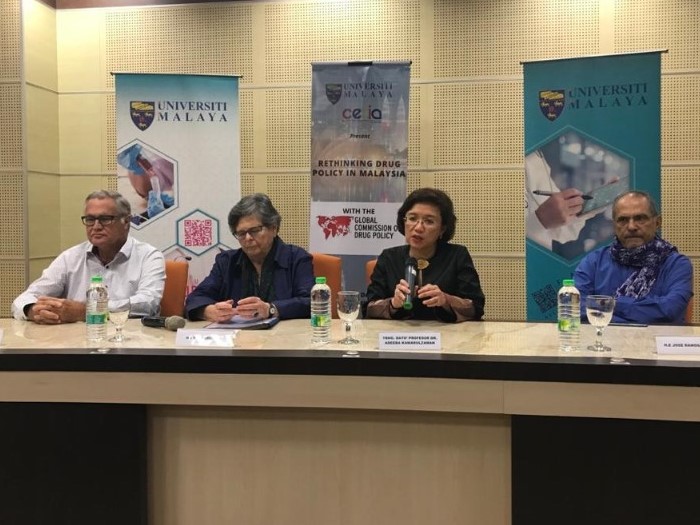KUALA LUMPUR, Jan 30 — An international drug policy reformer told Malaysia that enforcement efforts against the illegal drug trade are ineffective if the market prices of narcotics do not rise.
Ruth Dreifuss, chair of the Global Commission on Drug Policy, said an indicator of the effectiveness of measures curbing drug smuggling is more expensive illegal substances, as breaking up such operations will see a scarcity of narcotics in the market.
However, in most cases, Dreifuss has seen the market price remaining the same.
This means that despite such efforts by enforcement agents, the market continues to be alimented by those drug sellers yet to be caught, she said.
“So, it (enforcement efforts) is not very effective,” the former Switzerland president said at the “Rethinking Drug Policy in Malaysia” forum in Universiti Malaya (UM) here, when asked about the success rate of Malaysian police in curbing drug trafficking in the country.
Dreifuss’ comments come immediately after Health Minister Dzulkefly Ahmad today said at the forum that the police force has done a great job in dismantling drug syndicates, but that merely reducing the supply of drugs is not enough.
To curb the drug problem, he said, people need to first understand the problem of addiction and why people use drugs in the first place, as Putrajaya moves towards decriminalising drug possession for personal use.
Dreifuss also spoke of fighting corruption and money laundering operations on an international scale, saying as long as such operations are not dismantled, the interlinked drug trade will remain lucrative as its source of revenue comes from these operations.
Prof Dr Adeeba Kamarulzaman, dean of medicine and infectious diseases at UM, lamented that Malaysia is in the trafficking routes for drugs in the region, which makes illegal drug operations harder to squash, and the industry more profitable.
“With the drug business, when you arrest a group, another group will appear somewhere, simply because it’s such a lucrative business,” she said during a press conference at the forum.
“Not to say that these efforts (by the police in intervening in trafficking) shouldn’t go on, but the reality is, there are many people willing to risk arrest, (or) to risk even the death penalty because it’s very lucrative.”
More efforts need to be put in place to catch top-level criminals at the top of the hierarchy, like having better technology, more surveillance, and more resources, as opposed to focusing efforts on only catching low-level sellers and users, she said.
Today’s forum was organised by the Global Commission on Drug Policy and the Center of Excellence for Research in AIDS (Ceria). Dr Adeeba is Ceria director.
Dreifuss, meanwhile, said there was a need to differentiate access to illegal drugs and access to medicines. Between opioid heroin and pain medication morphine, for instance, there is no real difference, from a chemical composition point-of-view.
“So, because we are fighting against heroin, we deprive people of having access to morphine, and morphine is an essential medicine, absolutely needed, to kill pain.”
Methadone, another opioid used for maintenance therapy in opioid dependence and chronic pain management, is also considered an illicit drug and is not available in most countries, she added.
Dreifuss also said drug regulation can be carried out so that governments can control the market. This is the case in Uruguay and Canada, where cannabis use is regulated and allowed for not just medical purposes, but recreational use as well.
More than 10 countries legally control heroin for addicts, including Switzerland, which Dreifuss said was one of the pioneers in prescribing heroin in a strongly-controlled fashion for addicts who cannot live without heroin, and for those who do not respond to other treatments.
But not everyone in Switzerland is able to purchase heroin willy-nilly, she clarified, as each individual with access to the substance has to first receive special authorisation.








